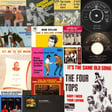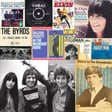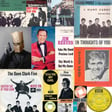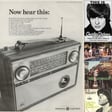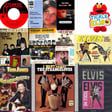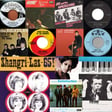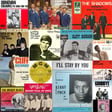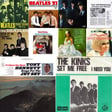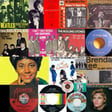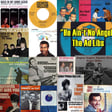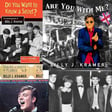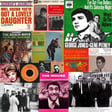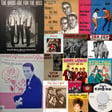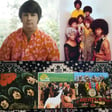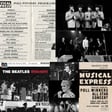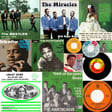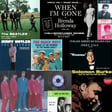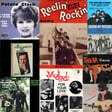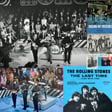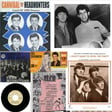Become a Creator today!Start creating today - Share your story with the world!
Start for free
00:00:00
00:00:01

August 1964 (side B)
We move through the second two weeks of August 1964 on the UK side. Two big hits you might not remember, and two more you certainly do! Create your podcast today! #madeonzencastr
Recommended
Transcript
Beatles' Motivational Chant
00:00:00
Speaker
The Beatles had this chant John Paul and George and probably then Stuart and Pete had this chant when things weren't going well which in their world wasn't very often because mostly it was an upward trajectory but nonetheless sometimes you know a bad night or the gig we didn't work properly or the amps broke or whatever. I say where are we going fellas and they'd go to the top Johnny and I say where's that fellas and they say to the top of most of the papamos and I say right and we'd also Cheer up. I'd say, where are we going, fellas? And they go to the top, Johnny. I'd say, where's that, fellas? And they say, to the top of most of the papamos. And I'd say, right. And we'd all sort of cheer up.
Introduction to British Charts August 1964
00:00:57
Speaker
Welcome to Side B, August of 1964. We are still on the British charts. This is going to be another four side month. Double album. Yeah, we're not going five. No, no, not five. I'm Ed Shein.
Chart Toppers: 'Do Wah Diddy Diddy' and 'A Hard Day's Night'
00:01:11
Speaker
I'm Kid O'Toole. And I'm Martin Quibbell. So we start with the third week of August, 1964 on the British charts, August the 12th to the 18th. At number one is Dua Didi. Didi. At number two is A Hard Day's Night.
00:01:27
Speaker
I don't know if I quite agree with that. I guess that's what the sales were, and I guess as people like Do I Diddy Diddy that much, but it shouldn't have displaced Hard
Marianne Faithfull's 'As Tears Go By'
00:01:36
Speaker
Days Night. It's darn catchy. It is. How long could Hard Days Night be number one?
00:01:42
Speaker
Just like, what, three or four weeks? Yeah. Two weeks on side A and I think the week before at the end of the last month. At number three, the Baron Knights with Culp the Groups. At number four, it's all over now by the Rolling Stones. As tears go by by Marianne Faithful, which moved from number 27 to number 19. Now, this is generally better known from the Stones' version.
00:02:07
Speaker
But I really like the Marianne Faithful version. The choranglay is a really unusual way to start the record. I really like the strings. The instrumental break does threaten to go easy listening, but it walks that line pretty well. The vocal is charming. Although it's in tune, it just seems ever so slightly flat.
Jagger & Richards' Songwriting Under Pressure
00:02:28
Speaker
Marianne Faithful isn't technically a great singer, but it fits the song.
00:02:34
Speaker
It just has a very English sound to it. I don't know how else to put it. Marv maybe will disagree. It's a nice melding of old and new. and Of course, it's a 60s pop record, but it just has this chamber orchestra kind of sound to it. So while the Stones version may be the best known, there's just something different about this.
00:03:14
Speaker
It is the evening
00:03:28
Speaker
This is the kind of record that Paul is making fun of on English Key. Yeah, exactly. And just instantly, I do think the Stones version is the better version of the record, but I like this one a lot.
Andrew Oldham's Strategic Influence
00:03:40
Speaker
Me too. I think the orchestration and the way that it is with the arrangement gives it a wistful, almost surreal Feel in a sense and added to that with marianne's voice which looks like a voice isn't technically one of the greatest voices ever but this human emotion that comes through the way that she performs it with the voice in most the song if that makes sense. No, I know exactly what you mean. It it has this wistful kind of quality. It works. I'll agree with Ed that as much as I like this song, and I do think the Stones version is better. Yes, agreed. So this song was written by Mick and Keith and Andrew Luke Oldham. It would reach number nine on both the UK and Irish
00:04:27
Speaker
singles charts. This would be one of the first original compositions written by Jagger and Richards just when they were making their transition from a R and&B covers outfit to a group who wrote original songs as we have seen.
Overcoming Criticism: Jagger & Richards' Success
00:04:40
Speaker
Oldham claims that he locked Jagger and Richards together in a kitchen and forced them to write a song together which became this song.
00:04:47
Speaker
pretty yeah And he actually said the kind of song he wanted. He said, I want a song with brick walls all around it, high windows and no sex.
00:05:02
Speaker
That's what he said. Wow. That makes me think of Brian Eno's oblique strategies style of songwriting. He just comes out with random words. He used to do that with David Bowie. He'd give him like these three words that had nothing at all to do with each other and just say, this is what you're going to write.
00:05:20
Speaker
Although the term brick walls with music and music reproduction means something very different these days. Yes,
John Dunbar's Influence on Beatles History
00:05:27
Speaker
that's true. Now, in his autobiography Life, Keith Richards said, we thought, what a terrible piece of tripe. We came out and played it to Andrew Oldham, and he said, it's a hit.
00:05:41
Speaker
So they had reservations about it, but Le Golden was right. It was a hit. Well, and then Keith continues, we actually sold this stuff and it actually made money. Mick and I were thinking, this is money for old rope.
00:05:58
Speaker
The other interesting thing is that they stole wine from Casablanca as this song was presented as, as time goes by. All right. Wow. Yes.
00:06:10
Speaker
and it was all of them that changed time to Tears. Tears is definitely the better lyric. Yes, I agree. Another interesting side note, when they went in and recorded it after Marianne Faithful finished recording her vocal, Andrew came up to me and gave me a big hug. Congratulations, darling. You've got yourself a number six. Yeah, that's not quite. so Gentlemen, you have your first number one record.
Analysis of Dave Clark Five's 'Thinking of You Baby'
00:06:35
Speaker
That's oddly specific.
00:06:36
Speaker
It is. It didn't actually get to six, but it got to nine, and that's pretty darn close. Yep, that's true. Wasn't she dating one of the stones at the time as well? Yes. Mick. Mick, right. well Well, didn't she date multiple? I mean, of course, we all know the stories about Marianne Faithful. Yeah. A little bit later, ah Mars bars anybody. Yikes. Okay, move on to the more interesting information as well.
00:07:05
Speaker
Yes. Marianne Faithful would go on to marry a figure who plays a pretty large role in Beatles history. There's our Beatles connection. So Marianne Faithful's husband would be one John Dunbar. o John Dunbar is probably best known to us as the founder of the Indica Gallery.
00:07:30
Speaker
Yes. Not the John Dunbar from Dances with Wolves. No. He was a partner with Peter Asher and there are lots of stories about Paul coming over and hanging shelving in the bookstore, which was adjacent to the Indica Gallery. cool The Indica Gallery is, of course, where John Lennon would meet one Yoko Ono. Yes. And the rest is history, as they say.
00:07:56
Speaker
And it is John Dunbar, Marion Faithful's ex. As John refers to John Dunbar, he talks about the infamous hammer nail and that's when we fell.
00:08:08
Speaker
Okay, we move on to number 31, Thinking of You Baby by the Dave Clark Five, which would move from number 31 to number 26.
Critique of Dave Clark Five's Musical Style
00:08:19
Speaker
This was one of the songs Ringo reviewed on his jukebox jury. What he said about it was, I quite liked it. Good old Dave, different from the last one, and the song would be rated a hit. Good old Dave.
00:08:33
Speaker
I agree with Ringo. It is different from the last one. It is a bit of Bo Diddley. It's got a really good lead vocal. The sax and guitar aren't great. It probably could have been improved with some more of the patented Dave Clark Five drums, but I still kind of like this song. Yeah, it has its moments.
00:09:13
Speaker
It nearly drove me out of my head Wow, it drove me out of my head now Typical blues progression. Where are those typical hard driving DC5 drums? I miss those. I do like the raspy lead vocals. Would have liked more of a real guitar solo, prominent in the mix. I was waiting for the song to really take off and it just never really did. There just wasn't a real hook
'Get Yourself a College Girl' Film Soundtrack
00:09:38
Speaker
there. There were some elements of it I liked, but it just wasn't one of the better Dave Clark Five songs, I thought.
00:09:45
Speaker
Yeah, more subdued and Dave Clark five and experimenting with something different. But yeah, fairly decent one for five progression, like he said, in the blue style 12 bar. This song actually came from one of those films, the DC five film. Get yourself a college girl. Now there's a title. Oh, dear.
00:10:08
Speaker
And the film features not only the Dave Clark Five as themselves, it includes The Animals, Stan Getz, and Astrud Gilberto. Oh, nice. Wow, Stan Getz and Interesting. And Nancy Snatra, but Nancy Snatra's playing a
Stan Getz and Astrid Gilberto's New Album Release
00:10:28
Speaker
character. Oh. Did you know there's a new album come out by Stan Getz and Astrid Gilberto? I think it's four vinyl sides of them live in Berlin. Oh, interesting. I think it's coming out around the time that this episode comes out. Great, check that out. And for 70s game show fans, Marianne Mobley's also in this film. That's a throwback. To tell the truth.
00:11:26
Speaker
The description is, a college co-ed tries to balance her time writing songs and dealing with a publisher who tries to pursue her. Oh, you sixties. Hang on to your grammar hats. It's the swingin'est blast ever filmed.
Other Chart Hits: Ken Dodd and The Kinks
00:11:43
Speaker
Oh, my head hurts.
00:11:46
Speaker
Yeah. Oh boy. Not that any of that has that much to do with the song itself, but we did talk about films not too long ago and we have to talk a little bit about that here. ah Why not? At number 33 is Ken Dodd's happiness. At number 34, get ready Marv. Are you ready? I'm ready.
00:12:07
Speaker
It is You Really Got Me by The Kinks, which would move from number 34 to number 15. Described as a love song for street kids, this would go on to inspire the who's can't explain. Pete Townsend has said that he composed it because of You Really Got Me. What can you say? Banger of all bangers. When you think in the 1960s, this is one of those songs that you think of.
00:12:49
Speaker
At the top in our feature last week, we spoke of Shel Talmy. And Shel, talk to us a little bit about, you really got me. When you come to working with the Kings, Ray Davis is saying that he was very influenced by jazz and blues like Big Bill Broomzy. And then you got Dave saying that he's inspired by Jerry Mulligan. So taking those different things, you as a producer, do you then meld that into songs like, you've really got me. Okay. For instance. ah well Well, let's go through the beginning of what you just said.
00:13:19
Speaker
okay um I was aware that Ray liked jazz. yeah It is a subject that almost never came up. What did come up certainly was the fact that Ray was one of the best songwriters I've ever run into. And once that was established and he started turning stuff out, which he could do in great numbers, is when we really got down to business. And as I said, I would do the arrangements and we'd rehearse and go in and record them. Obviously the first one that people really took notice of it was you really got me. yeah And that put the whole thing pretty much on a pass that lasted for all the years that I was working with them. Yeah, I mean, it's it's definitely got a ah big sound and you've really made something of it with the double tracking of Dave. So Dave's doing the the rhythm and the lead on there and giving it that big sound.
00:14:18
Speaker
I liked cutting loud, so yeah that allowed me to make a nice loud record, and which you followed which that was was followed by My Generation, of course.
00:14:30
Speaker
and that was enjoyable because of the fact that I had terrific musicians and terrific songwriters and made my life a lot easier and and and certainly more enjoyable. But then also with a lot of the early kinks work as well as opposed to having Mick on the drums you've got Bobby Graham and then at a later time you get other people doing drums as well so is that like a conscious decision with the band? Okay well when I started training as a recording engineer yeah and got with that quickly and then started doing records there at Conway. I had the opportunity to use the wrecking crew on a regular basis because Conway was their favorite studio. So I got to know what a really great musician sounded like in the first place. Bobby Graham was one of the best drummers of all time. And the guy that they originally had was not as up to it as the bobbyres as Bobby was.
00:15:30
Speaker
and So now I use Bobby. And then eventually you'd have Clem Katini as well. He'd be doing some drums for for them as well. Oh yeah, Clem Katini, yeah, absolutely. Use him a bunch, yeah. After Bobby retired and all that kind of stuff, yeah. No question. Where do you start with this? It's one of those songs that even though you've heard it a thousand times, there are new details that can stand out. For me, as I was listening to this again,
00:15:57
Speaker
The piano really stood out. I mean, it was one of those details that I thought, wow, I don't know why I'd never really listened to that closely before. But I mean, the piano sounds fantastic. And then, of course, Ray Davies voice. I love how it changes throughout the song, how he plays with the shades of his voice as it goes on. You know how in the beginning it almost sounds a little subdued, just go, yeah, you really got me going, you got me so, and you go, girl, you really got me now, you got me so I can't sleep at night. And then it starts getting really snurly. Yeah, you really got me, you know and then it just explodes in the middle. I just love
00:17:08
Speaker
Dave Davies solo in the middle. Come on. yeah Come on. It's one of the great guitar solos. I mean, it's it's sort of like grunge before it became grunge in the 90s. That distortion on his guitar. It's just timeless. Yeah, it's 1964, but it almost doesn't sound like it. It sounds just as dirty and grungy today as it did back then.
00:17:32
Speaker
Well he actually cut his guitar amplifier to get that tone. On the front of the amplifier he's got like a cone inside behind the grill. You've got a cone. He wanted this really dirty sound so he actually took a razor blade or something and cut the actual cone to get that really dirty distorted tone that you've got on there as well.
00:17:54
Speaker
Wow. And that's not an original trick. There's a documentary on the invention and evolution of the electric guitar that played on PBS a while back. I just consider myself an average guitar player who looks for sounds. i would Even, I said, um I knew back in the old days, I never could be a a really good, clean jazz or a good, even clean country picker. So I was looking for sounds. That's how I made rumble, you know, picking, sticking holes and and in tweeters because at that time he didn't have the electric boxes that you got in today, you know? Okay, so he was copying a trick that was already done beforehand. Yeah. It's quite possible that Shell might have suggested that to him, a having already known that trick himself, the the producer. here Although you've got to be willing to ruin your amp. call so yeah But it was so worth it. What was your inspiration for the guitar sound on the first King's record? Well, we had that sound about six months before we recorded, it before you really got moved around. I used to experiment him with the guitar, but the guitar sounds are very limited. They have just tone control and volume. That was about it. And I came across this little amp in the shop up the road, and it was called Nail Pico. And I just got a razor blade and started to cut the cone and the speaker. I don't know why.
00:19:18
Speaker
Dave Davies, a member of the Kinks, has taken issue with Guitar World magazine after the publication, published an article in which it was stated that rock producer Eddie Kramer had confirmed the long-standing myth that Jimmy Page, a member of Led Zeppelin, played guitar on the band's smash song, You Really Got Me.
00:19:38
Speaker
According to reports, he stated, I met Jimmy while he was working with the Kinks in the early 1960s when they were doing You Really Got Me. I am aware that the Davies brothers will argue that this is not the case, but I can remember Jimmy coming in and performing an overdub on that song. There are some people who disagree with that, but that is how I recall it.
00:19:59
Speaker
After some time had passed, Davies moved to social media to refute the idea, pointing out that Kramer maintains that he never made those comments. For years, there have been rumors going around that Page was featured on the song, however. Both Davies and Page himself have rejected the rumors.
00:20:16
Speaker
In the United Kingdom, You Really Got Me, which was the King's third single ever released, reached number one on the charts. It was the band's first hit in the United States, reaching its highest position on the list at number seven. Michelle dismissed that myth that it was Dave and Jimmy Page on this, whereas the truth is that it's actually Dave doing both guitars.
00:20:38
Speaker
Isn't that amazing? Because that riff, isn't it crucial that's on the da da da da da? I mean, that's just as crucial as anything. It's one of those riffs that as soon as it starts, you know exactly what the song is and it propels the entire track. I know why they did it because Ray Davies has said that when going into the session he just wanted to do the vocal and wanted Dave to do all the guitar work because Ray was saying he really needed to just be the singer and let himself get more emotion out as the singer and put more of a performance in as the singer. So they'd record it first with Dave doing the rhythm guitar that all the way through and all. So he got the backing track and then they'd get Dave
00:21:24
Speaker
to overdub. I think that the lead guitar is an overdub, but it carries on that emotion that Ray's built up to in his vocal. The guitar carries it on and takes it that bit further. It's a natural progression of the emotion that's in the lyric. It's really clever how the solo works.
00:21:42
Speaker
agreed and I think that's really important how you said that Ray wanted to focus on his vocals throughout that song because you hear it from the beginning gradually building up to that explosion cued in by that oh yeah so he really clearly was intentional in that that he was focusing on gradually building up to that drama and you can hear it And his voice, how he starts out fairly low key in terms of emotion. And then when he gets that grit and snarl in his voice, I love that. Clearly he was working on it and rehearsed it. So that's fascinating that he, you know, handed over the guitar parts to his brother so he could focus.
00:22:22
Speaker
This is Bobby Graham on drums, and you've got Mick Avery, the band's drummer actually playing tambourine, so it's not like Mick Avery's had his nose pushed out of joint or anything, they were very happy about it. But you've got a really good performance there, and I think Shell was right to pick that way to do it, because the way that Bobby Graham's drums lock in fantastically with Pete Quaife's bass is just amazing, that's really inspired production by Shell.
00:22:47
Speaker
Agreed. The drums are powerful, too. I shouldn't leave out the drums. They're just as crucial to blocking in that riff and everything. And it has that same kind of grungy, dirty sound almost as the guitar. I mean, it isn't like a crisp sound, but that's OK because that's how the whole record should sound. yeah But the piano is played by a classical pianist and a arranger. No kidding. That's performed by Arthur Greenslade, who would do many theme songs.
00:23:17
Speaker
but he would also go on to work with Diana Ross. He'd also already worked with The Bachelors, with Shell as well. He would also work with Cat Stevens, so you would recognise his arrangements in Father and Son. Quite a few of the orchestral arrangements on Cat Stevens songs were actually done by this guy.
00:23:37
Speaker
Wow, fascinating. Although you have to wonder whether Ray Davies hasn't had a little bit of John Lennon syndrome because he has done a couple of different versions. We are going to have a supercut. This is one that we could not not have a supercut on. But I want to bring up one version in particular. In 2009, Ray Davies released an album called the Kinks Coral Collection. And he does just a stunning version of You Really Got Me.
00:24:06
Speaker
with a complete choir. oh That's amazing. That's really good. The album version is great, but I actually prefer he did it live on David Letterman in November of 2009, and you can find that clip on YouTube. And there is ah there is a touch of that in the super cut, which is coming up. Great. So some of the other versions of You Really Got Me, as we know, everybody has done it. The Knickerbockers, Knickerbockers best known as the band that everyone thought sounded exactly like the Beatles, which they really only did once with lies. Yep. Robert Palmer.
00:24:45
Speaker
Oingo bongo nice slide in the family stone Paul Revere and the Raiders the 13th floor elevators the smithereens with the kinks cool so there's there's there's a second version with Ray Davies Iggy pop Ray Davies and Metallica there's a third version with Ray Davies the coral version so that's a fourth version with Ray Davies you see what I mean about he may have had a little bit of the John Lennon syndrome maybe The other version that people think of, the Van Halen version, and Tom Petty did a cover of it. The Van Halen one, I remember very well. That was played on radio. I don't know how far that got on the charts, but that I remember. So, all right, here's the super cut. Our next guest, truly a legendary singer, songwriter, and performer, and and by the way, nice turnout. Yeah, yeah, pretty good.
00:25:37
Speaker
uh... his new cds entitled uh... the kinks uh... coral collection please welcome with the desktop chamber choir the great ray davies ladies gentlemen
00:26:34
Speaker
you really got me now
00:26:51
Speaker
going you've got me so I don't know what I'm doing
00:28:54
Speaker
What a great collection. There it is. The King's Pearl Collection, Ray Davies. Thanks for watching, everybody. Greg Ferguson is next. And so we will let Shell have the last word, not from our interview, but from some standard material. I'm very proud of the fact that the recording does still stand up. It has not dated. It has not aged. And it's as good, if not better than anything that's around today. Well, I think we might agree with you there, Shell. There you go. Here, here.
00:29:24
Speaker
All right, we move on to the next song and it is the next song. So You Really Got Me was at number 34. Following it at number 35 is She's Not There by the Zombies, which moves from number 35 to number 28. Before we move on, we will express not quite condolences, but you will express our deep consideration to the zombies and the zombie family. Well, why don't you tell them, Marv?
00:29:52
Speaker
Yep, because the sad news that Rod Argent had suffered from a very serious stroke, he's decided that he's no longer going to be able to tour with the zombies, and so he's in recuperation at the moment at home, and the zombies are around him. These fellow zombies, both present members and past members, including past member Chris Wright, are all surrounding his family and looking after him, and we we ourselves have been in touch with them. Our thoughts are with him and and his family, his friends. Just really sorry to hear this news. And although trivial, we have we do have to mention it, Rod Argent and she's not there. We're part of the All Stars for a year. Isn't that that show that we actually reviewed the one a while back there, Marv? The All Star show you reviewed? It is. Yeah, that's what I thought. Go looking for that if you wish. I can't believe this only got to number 12.
00:30:47
Speaker
Yeah, that's a shocker. I mean, talk about a classic. She's not there. I mean, to me, this is another of those songs that, when I think of the sixties, I think of this song and I'll think of, we'll come to it in a few, quite a few years, time of the season and things like that. I'll think of those songs as being quintessential classic sixties songs.
00:31:06
Speaker
Exactly. Yeah, that was a shocker to me. To see that only got to 12. So the other Beatles reference, this was one of the songs that George reviewed on Jukebox Jury. He would rate it a hit. What he said was, Yeah, the Aryan bullies on the vocalists were great. for the The voices were marvelous. Very good zombies. And the chord sequences, you know, were very nice. And I think it'll be a hit.
00:31:34
Speaker
and time Right on George. Right on. But it's the first ever single as well. Wow. This is really sophisticated for a first single straight out of the gate because I'm hearing really just tinged chords in there. Well all those minor chords, they're not pop or rock chords. No, and then there's almost a hint at a Latin feel there as well in the rhythm.
00:31:59
Speaker
I was so thrilled to see this song was on the charts because I love the zombies. I've always felt they were definitely one of the standout groups of the sixties. I'm sure many agree. Love this song. You just nailed it, Mark. One of the reasons I love it is is that they were so influenced by jazz, clearly. And this is exhibit A, the minor heavy chord changes, the keyboard solo.
00:32:55
Speaker
is so jazzing. And I just felt so many of their songs were like that. and They just had such a different, more sophisticated sound than some of the other groups out at the time. Rod Argent later said that the birds once said that the solo on this influenced part of 8 Miles High.
00:33:17
Speaker
wow so many of their other songs time of the season it was the chord changes and all that just grabbed my attention just thinking wow this is something that nobody else was doing at the time i know the Beatles were sophisticated in their own way but and at that time a word from a Beatle was like something from Mount Olympus you know it was just unbelievable she's not there came on and and at the end of it he said well don't zombies you know He said, that was great, and that's a hit. and And he actually said something also, I can't remember what it was, about the solo in it, and and um you know the pianist solo. And he said, if that's their real player, that you know he's really good. And it was just absolutely wonderful, and and that really helped propel it
00:34:06
Speaker
into the lower reaches of the charts, and it then took off from there. And many, many years later, I remember Pat Metheny, I met Pat Metheny, and when he just started, and and he knew who I was, and he said, you're Rod Argent, and I said, yeah. um And he said, oh man, she's not there. He said, all that modal stuff, that was the record that made me think,
00:34:30
Speaker
I had a way ahead, you know, do it in sort of jazz fusion. I thought jazz fusion, it's that and there's no modal stuff in that. And then I went back and played it. And I realized that over the opening chords that I just thought were A minor to D, very ordinary sort of chords, I constructed a modal phrase. But completely without thinking about it, I had no idea that I'd done that. um But it was just imbibing all the sort of some of the great music that was around at the time.
00:34:59
Speaker
So that was the whole story of the but first song. He must have been an influence on future keyboard players like Emerson and Wakeman. I have to say, in the last few years, it completely knocked me out one Christmas. I was at um my brother-in-law's place, who is actually Paul McCartney's recording engineer. um And suddenly on a Johnny Walker show,
00:35:21
Speaker
um He had Rick Waitman being interviewed and he said, you've got to you've got choose a long track ah that you love. And he said, well, I want you to play the long version of Hold Your Head Up. he said And he actually said, I can't believe he said this, but he actually said, um that's the greatest organ solo on any record. And I thought, oh, wow, you know, it it made my Christmas, I tell you.
00:35:44
Speaker
And the other thing, I mean, we talk about Brian Wilson, we talk about Paul McCartney. Rod Argent heard all of this in his head. He wrote the opening bass downbeat into the song for Chris White to play. And he wrote the bassline all by himself, not just that. He wrote the signature hooky drum part and wow he wrote the keyboard part. Wow. so My gosh. He definitely, um you know, and I wish we could have spoken to him because I wanted to ask him about his jazz background. Find out, you know, where he got that because it is so obvious that he had at least a love for jazz or some kind of training. These are some sophisticated chords. like yeah I just thought we were being the beaters in inverted commas, really. You know, we were just making our song
00:36:31
Speaker
and just doing that in a very straight head rock and roll sort of way. But I had a love for many different sorts of music, including classical music, but also jazz. It was a great jazz scene at that time. ah realm When I got first of all interested in rock and roll in around 1956,
00:36:48
Speaker
It was a great time for jazz as well, and the Miles Davis band with Coltrane, Cannonball Adderley, and a bit later, Bill Evans, and you know all these guys, all that was going on, and that sunk into my brain as well. I never thought we were using any of it, but um somehow, in the recesses, it was there.
00:37:07
Speaker
that keyboard solo And I always wanted to solo on everything that we can did. yeah That was one thing that was so unique too about you guys was it was not a guitar solo, it was keyboard. But I really came unstuck with that because on all the early TV programs we used to do, um none of the cameramen understood that a keyboard player could take the solo. right So I would have my big moment, you know, the camera would have been on Colin. yeah right No one told me about it.
00:37:32
Speaker
and all this and then we had the harmonies and occasionally if we were lucky we got a glimpse of camera and then I zoomed into my solo and the camera would go on the drums. Or somebody but anyone. anyone but so yeah so that that It didn't always work for me being a keyboard player. now you know you did that Is it true you did that in one take? Tell her no. She's not there. Yeah, yeah I mean, but we we did several takes, but for instance, the so the solo were was was different on every take. I've heard some of the outtakes and we we truly used to improvise. ah You know, it wasn't like we would work out something and set it. It was always improvised. But it was very quick, wasn't it? You would have done the lead vocal in.
00:38:17
Speaker
And we used to do, we only have four tracks as you know in those days. So, Colin would have a track to himself. With the backing harmony. Oh, with the backing harmony. yeah we Oh, so it was fixed. So, you know, those the four tracks fixed the balance that you got. The harmonies, oh my gosh, how can we forget the harmonies. The harmonies too. Maybe Beach Boys influence.
00:38:38
Speaker
yeah ever so slightly. Just a great record. Just one of many terrific records that the zombies made. And the recording of it is really pretty interesting. They were originally going to go in and record Gershwin's Summertime as the first single. That fits. But the producer Ken Jones said, you should really try and write something for the session. Argent says that he'd only ever written one song before. Wow. Cue the clip of Rod saying exactly this.
00:39:09
Speaker
that That was just the second song I ever wrote and wrote it for our first recording session. You're bragging now, right? Well, and but but it's part of the story, really, because the thing is, um we were so young and naive that when our producer said, you guys could always write something for the session, I went away and wrote something. Chris White, our bass player, went away and and wrote something. And and you know I was full full of the arrogance and naivety of youth and thinking that nothing could go wrong.
00:39:37
Speaker
Retreating to his room for inspiration, Argent saw the name of the track. No one told me on one of his John Lee Hooker albums. There's John Lee Hooker again. And then when they got to the studio, the engineer, Terry Johnson, had been to a wedding before he showed up that day. So he was drunk. And nice. Johnson passed out.
00:39:59
Speaker
So the recording was taken over by the assistant engineer, Gus Dudgeon, who is now legendary for working with Bowie and with Elton. Fantastic producer. Argent continues, I didn't realize until recently that Terry Johnson must have come back the next day after he sobered up. So he had a lot to do with how that record sounded. Hats off to him because it was a terrific sounding record. Yeah, they just sounded like no other fans time of the season, another example. Great record. No Supercut because we're not gonna put Supercuts back to back, but we will give it its proper due. Yep. At number 37, Light Dreamers Due by the Applejacks. At number 38, The Mojo's with Why Not Tonight. At number 39, My Guy from Mary Wells. At number 40, the next song from the Foremost, How Can I Tell Her, which moves from number 40 to number 33.
00:40:53
Speaker
Another one where we don't know whether George actually liked it. He rated it a hit, but he says, i think yeah it grows on you i've heard a couple of times i like him more each time and the firms had a quite big hit with the last i think this one should do i hope so of one our friends you see I don't love this record. The military drums opening are okay. The harmony is good, but not great. I don't really like the cadence, which then goes double time. This is a case where you can hear the bass and I like the bass. Here you get the pounding drums. I do like these slightly Spanish acoustic. I just like pieces of this song, but not the whole thing.
00:42:05
Speaker
I did not like that march rhythm drum pattern. That got really old, fast, and even more annoying, as you said, Ed, when it went into double time, and those lyrics. Oh, man. The kind that you can predict the next line. See the girl over there with the sunlight shining in her hair. She's the one I love. Oh, how how can I tell her? I can see by her smile. She is warm and gentle all the while.
00:42:34
Speaker
lips of wine would be mine. I mean, you know, it just goes on and on. You can predict the next line, you know? Just a lot of cliches. Just thought that marching rhythm was kind of a strange choice for a love song. I just didn't really care for this.
00:42:50
Speaker
I didn't care for it too much either. The lyrics were written by the lead singer, Brian O'Hara. Sorry, Brian. and Sorry, Brian. Rest in peace. I think we can apologize to the foremost fans here. Yep. Sorry, foremost fans. Sorry. Just this one I didn't care for.
00:43:06
Speaker
so many tomatoes this month. He wrote it alongside two people who used to be a singing duo called Carter Lewis. Neither of them is the real names. John Carter, his real name was John Shakespeare, and Ken Lewis was Ken Hawker, who became songwriters for hire after they released two singles in 62 and 63 that didn't hit. So they just decided, well, that's not working, so we'll become songwriters. More information about this song than you thought you'd ever get.
00:43:37
Speaker
Okay, we move on to number 43. The next one from The Bachelors, I Wouldn't Trade You for the World, which would move from number 43 to number 21. Ringo didn't have a whole lot to say about it, but he did voted a hit on Jukebox Jury. More of the 50 style harmony singing. I don't really like the lead vocal. The harmony's all right though. The strings are so-so. The harmony and the piano are the best part, but both kind of get a little bit lost. A game produced by Shell?
00:44:06
Speaker
The production was fine.
00:44:41
Speaker
As far as just the song goes, it's just to me not as good as a traditional 1950s four-part harmony song. I mean, it just sounds to me like a pale imitation. It's not Blue Moon. The lyrics were just kind of dull, just sort of imitating. You fill all my sweetest dreams with a love so divine, so oh divine. You're like precious gems and spices. It's so wonderful. You're my own. And the harmonies, I mean, they were fine.
00:45:12
Speaker
But they were just boring. yeah I mean, as you said, and they just kind of get lost. I have to put in a Betty-ism here. She was listening and all she said was, no. We're infecting Betty now, huh? Yep, exactly. When the song ended, she just said no. Our good friend Jim Reeves would also have recorded a version of this.
00:45:37
Speaker
Wow, okay. At number 44, Non ho leata par amarati by Gigliola Cinquetti. I have no idea if I got any of that right. Sounds good to me. It's fine. Yeah. The title translates to I'm not old enough. This was the winner of the Eurovision Song Contest 1964. It was thus a resounding victory for Italy and 16 year old Gigliola Cinquetti.
00:46:27
Speaker
song Nono Leda in which she proclaims that she is not old enough to go out with the person desiring her alone can be described with many adjectives, understated, spellbinding, beautiful, timeless, but none of them will really make it justice.
00:46:43
Speaker
good voice but the song doesn't stand up. It's just too much.
00:47:02
Speaker
The audience at the Tivoli agreed and gave Gileola a standing ovation. Depending on your perspective you can't interpret the lyrics as directed to a slightly creepy older man or as a beautiful profession of love by a young girl. I have decided on the latter because I really really like this song. Gileola was and remained the youngest winner of Eurovision ever until the less understated Sandra Kim This was a big deal back then. She was 16 when she won Eurovision and had what is still the highest ever percentage of first place scores in the contest. Eight out of
00:47:45
Speaker
15 possible and She did continue to have a very successful career. She was a well-known singer in Italy parts of Europe South America and Japan ever since her ah Eurovision win and had ah subsequent appearances in the same contest as a singer and in 1991 as a host and Interestingly, she came in second in 1974, but lost to Abba for Waterloo. Wow. Yeah. What a song to come number two to, then. Yeah, exactly. Yeah, she wasn't gonna win but with the Waterloo. She remains a well-known singer in Italy and still appears on TV also as a presenter. She's released many hit albums there.
00:48:34
Speaker
and her recording of this song entered the UK charts in 64, reached number 17, but remained in the chart for remarkable 17 weeks, something that only three other Eurovision songs have achieved in the UK. So this was a big deal back in the day. I agree with you Ed. you know She has a good voice, but it's definitely You know, it hasn't aged that well. I did find a translation. I'm not going to read the whole thing, but does you know it's not the right age to love you. It's not the right age to go alone with you. I don't know what else to tell you because you know so much more than what I do. Let it live the that romantic love. Let that expected dream come in time, but not now. That's basically the translation of some of the lyrics. Was somebody listening to Baby It's Cold Outside? Yep.
00:49:32
Speaker
But basically it's, let's wait until she's of age and then they can, they can, you know, pursue their romance. It's interesting that we've got two songs, which are really big songs, but we don't really remember either of them.
00:49:49
Speaker
we'll We'll get to the next one in in a second here at number 45 is Dimples by John Lee Hooker. At number 46, The Wedding Song by Julie Rogers, which would move from number 46 to number 25. This was a multi-million selling single. Yes. I had never heard this song before in my life. Me too. Me too. A really big song, piano and strings. She got a strong operatic voice, but when the backing ramps up, it's all just a bit too much for me.
00:50:18
Speaker
yeah this but yeah Very dramatic. But this was, as you said, a big selling song. This was played at weddings for years and years and years. Originally it was a popular song by Chilean songwriter Joaquin Preto, first recorded by his brother Antonio Preto, it was first recorded in Mexico and it became an instant hit in that country and in Chile. I was just happy to be recording. I mean, that was the high for me then, let alone I didn't even think about hit records. um So to have a ah record sort of zoom into the charts and sell 45,000 a day as it did then, it was just a wonderful, wonderful time. Now, of course, there were quite a few major artists around at the time that we'll all remember, you know, notably people like Dusty Springfield. The link between Dusty Springfield and you, of course, was the producer Johnny Franz, who really gave you that big break. Exactly. I mean, Johnny, I mean, I have to say, he was a genius of an A and&R man. He went on his own instincts. He never asked people, you know, like they do now, should we put this out or that? He said, this is going to be the one.
00:51:24
Speaker
and of course he had Dusty, the Walker brothers. It was great because I used to walk into the studio there and hear Dusty and ah another studio doing her stuff, you know, wonderful, wonderful times. How did he find you then? How did you get that opportunity in the first place? My first professional job was with um the Teddy Foster Big Band at that wonderful Butlins and Filey, that wind-blown place. And done I did two seasons with Ted, and he said, look, you really shouldn't continue singing with the band. You've got to start recording. And he took me to Johnny Franz in 1964, and I auditioned in his office. He played piano. He was a wonderful musician, Johnny. And um he gave me a contract, a five-year contract straight away.
00:52:07
Speaker
So no looking back from there on, now the wedding itself was an interesting choice of song as well because it had been written by an Argentinian. Whose idea was that for you to record? Well, the first record that I did, my introduction into the business really was a rehash of Doris Day's It's Magic. And I did all the local television shows, because there were loads then that you could do to plug a record on. And I did one for Barry Langford in the BBC2 Studios. He was producing Beat Room, which I did with Tom Jones at the time. And he got a hold of this record and he sent it.
00:52:39
Speaker
to Johnny Faz and said, I think this would be good for Julie Rogers. Now, it had been recorded about eight times before in the States, but they'd done it very straight, very sort of churchy.
00:52:50
Speaker
And I said, well, I love the song. So did Johnny. I said, but the arrangements are terrible, you know. So we had Johnny Arthur do us, you know, a real sort of pop um version of it. And everything worked out. I mean, it was great. And I remember Johnny saying to me, because in those days you recorded four tracks in three hours. And Johnny said after, we go you can go out and order your Rolls Royce now. And I said, oh, you got to be joking. You know, I thought he was kidding me.
00:53:14
Speaker
I got a mini-minor in the end. And it was huge. It became this big, big hit. And not only Britain, it was a hit in America. It reached number 10 on the Billboard Hot 100. It reached number one in Australia and everywhere. Yeah, by 1972, they say it had sold seven million copies. And for many years, it was a popular selection at wedding ceremonies around the world.
00:54:12
Speaker
I do not remember ever hearing this song. I found it very overproduced, over dramatic, but hey, I guess we can't argue with facts. And we should mention that she married Teddy Foster in 1968. Yes. Well done.
00:54:30
Speaker
Shall we say congratulations to this student band? That's right. And Marv, you get a James Bond mention. Julie recorded a demo of You Only Live Twice, which appeared on the 1992 limited edition version of the album, The Best of Bond, James Bond. John Berry and Leslie Bricuse later wrote a completely different title song and gave it to Nancy Sinatra. know Wow. Wow. I know which one that is, then.
00:54:58
Speaker
All right, at number 47, nobody I know by Peter and Gordon. At number 48, You're My World by Silla Black. At number 50, Move It Baby by Simon Scott, which would stay at number 50 for one more week.
00:55:34
Speaker
The bass is a bit, I saw her standing there like, I agree. The bass definitely sounds like I saw her standing there.
00:55:45
Speaker
Not as much as that song we had on the American charts last month. The guitar feels a bit brittle. I mean, we were talking about over modulated and distorted guitar. This is that, but not in a good way.
00:56:00
Speaker
right the lead vocal is just too smooth and i don't really like the harmony vocals all that much this was on the august jukebox jury the panel voted it a hit but ringo dissented and voted it a miss i have to agree with Ringo. It makes sense that the lead vocal was a bit too smooth because Simon Scott, the singer, was born in India and grew up singing in church choirs and even sang light opera. So that kind of makes sense then that his voice would sound a little too smooth for this. And the backing band was his band the La Roys, which was a rockabilly band.
00:56:41
Speaker
And the song itself sounded a little bit like Cliff Richards' Move It. But yeah, I just thought this was kind of a limp, kind of an attempt to sound a little like a throwback to late 50s rock. That makes sense because somebody actually said it sounds a bit too much like that in the press at the time as well. It's even got the 50s slapback reverb on it.
00:57:02
Speaker
and it was produced by Robert Stigwood. All right, we move on to the final week of August on the British charts, the week of August the 19th to the 25th. At number 31, Such a Night by Elvis Presley, which we discussed on the US side. At number 39, cover of I Should Have Known Better by the Naturals. You look at this single. Do you think they were trying to fool the public a little bit?
00:57:31
Speaker
Maybe a little. It even includes the disclaimer this is from the film A Hard Day's Night. The naturals are smaller than the John Lennon and Paul McCartney writing credit. You don't say. So George reviewed this on Jukebox Jury. It was not bad. I don't think it'll be a hit somehow because and Well, for a start with without being conceded, I haven't sold a lot, but this one is, you know, it could have been a bit better somehow. Something tells me it's too much echo and a few clothes there, I didn't know were in it.
00:58:10
Speaker
Ooh, that's like a sideswipe, that one. Yeah. One of the other folks said to him, well, why didn't you guys release it, meaning the Beatles? Of course, in the United States, they did release it. Yeah. Then George just sort of looks at the camera and says, well, you see, you've got to have something for the singer. And if we hadn't had that one, if we don't have that one, the Beatles said, why didn't you do it? I mean, it's an extra one. It's an extra one. Well, you've got to have something on the LP, haven't you? A fairly similar arrangement. It feels a bit dashed off.
00:58:39
Speaker
and it's a good enough cover it's not
00:59:13
Speaker
This band was managed by Brian Epstein and the music was handled by Dick James. yeah I agree and it does sound pretty dashed off. It's records like this that really show why Ringo was a great drummer.
00:59:27
Speaker
because the drumming is so overdone on this, particularly the fills. They're just too much, just all over the place. Too many times, too many flourishes, really didn't like it. I'll be interested to see what you think, Marv. And I hated the falsettos.
00:59:53
Speaker
Too many and just not well done. ah Really trying to stretch their voices and doesn't quite work for me. yeah I just thought this was not a great cover to say the least. How do I put this nicely?
01:00:09
Speaker
Oh, you don't have to put it nicely. OK, you know those records, those knockoff records that you could would get where people would do cover versions, but they couldn't get the proper version of the record. This is almost slightly better than some of those really bad ones of those. I agree. So that's my opinion, really. I don't really know what else to say about it. Did you agree about the drumming?
01:00:37
Speaker
I agree with you on that. Later on this year, we'll eventually get to the Who. We'll get a drummer, Keith Moon, who was brilliant at emphasising things. He will use drums to emphasise parts of songs. He was well known for doing that. He does fantastically at doing that. This guy doesn't. Yes. Yeah. I mean, he would throw in fills where they had no business being there.
01:01:06
Speaker
for no reason. It's like, why? Yeah. But Keith Moon would be known for doing that sort of thing where we were putting fills to emphasize lyrics or emphasize parts in songs. He did it musically, not just showing off, which people get wrongly about Keith Moon. He was doing it to emphasize what was going on in the music, not to showboat.
01:01:31
Speaker
Thank you. And a little tiny bit of myth busting. There are apparently some people who believe that John and Paul wrote this for the naturals. No, no, that is not the case. John and Paul wrote this because George had gotten the free wheel and Bob Dylan album.
01:01:48
Speaker
while they were in Paris. And so John Redley admits that this was at least in part one of his early Dylan inspired songs. So they wrote it in Paris in mid-January. They recorded it in late February.
01:02:05
Speaker
And they were basically in Britain for no time, maybe half a day or something. Brian did not even ever mention this song to the Naturals until after the Beatles had recorded their version. There you go. Myth busted. Yep. And we're going to get a much better song next.
01:02:23
Speaker
yes indeed okay we move on to number 40 i'm into something good by hermans hermits we've covered the original version although we do have some new information about that which we didn't have last time this is the song or one of the songs along with I'm Henry, the eighth I am, which made Peter known a household name. Absolutely. I mean, what can you say? This is a classic and slice of sixties pop. This is it. You know, and we've heard a version of this, of course, the original version by the cookies.
01:02:56
Speaker
And I like that version, too, by the way, we reviewed it on the American side and like they we've got a story about that coming up here. We'll get to that in a second. But, you know, of course, this is the well-known version. And what can you say? I mean, it is just, you know, Peter Noone turns in a great vocal here.
01:03:53
Speaker
He encapsulates the teenage first love feeling, the boyish charm that he has. It is just so catchy. and Goffin and King just know how to write lyrics that are straightforward to the point, sing-along quality, you remember them, and it's well-produced in a range. No annoying organs, no corniness to it. Perfectly placed hand claps. 60s pop perfection. Beautiful piano and guitar. They harmonize each other at points in the solo, the piano and the guitar.
01:04:29
Speaker
and then they do different things and they keep coming back and joining each other and I just love that section there.
01:04:53
Speaker
Everything is just exactly in the right place. Pete's voice, you know, is 16 at this point. Amazing, incredible lead vocal. The rest of Herman's Hermits, their backing vocals are amazing as well. It's just an absolutely perfect production.
01:05:10
Speaker
Sixteen, my gosh, I didn't realize it was that young. That's amazing. Now, Carole King says that those high, floaty backing vocals were an early homage to the Beach Boys. Do you hear that? I don't quite. Not really. I mean, I guess a little bit. The harmonies aren't as sophisticated. sophisticated I mean, these aren't four freshman harmonies here. no And that's fine. This kind of record doesn't need it. But I don't hear that level of sophistication here. Maybe that was the original intention of this, but certainly you don't hear that level of harmony here. I mean, no offense to the Hermits. yeah um Absolutely no offense at all because this is a great record. Yeah. And Brian Wilson would record his own cover version of this. And that too doesn't really sound Beach Boys-ish to me. No. Hmm.
01:05:58
Speaker
So all right, we can go into a little bit of technical talk here, a little bit of chord talk here. This is basically just a 12 bar blues. Yeah, that's true. Yeah. It includes what is referred to in the community as the blues turnaround in place of the standard chord progression of four, five, one.
01:06:18
Speaker
The blues commonly reverses those, the four and the five, producing a softer, less final cadence. I'm Into Something Good makes a feature of this because the climax of the tune, some then tells me, not only occurs on the chord five, but marches steadily up the arpeggio itself, GBDG landing on the song's highest note before happily resolving with the song's title.
01:06:44
Speaker
the The upshot, it's it's an interesting, not quite perversion, but slight alteration of expectations on a 12-bar blues. Yeah. Now, the alder story about this, as mentioned, the cookies, or rather Earl Jean McRae recorded the previous version of it, which we had on the American charts. Well, there's a reason for that.
01:07:05
Speaker
little bit of a scandal. In late 63, the cookies were on tour with their Goffin King hit, Chains, which of course we all know, Beatles covered it, and Earl Jean McRae became pregnant. The father, Jerry Goffin. And so, astoundingly, Carole King, rather than booting Jerry, Her husband? Yes, her husband to the curb. She agreed with Jerry that they should take care of Earl Jean financially. So in addition to taking care of her financially, they gave her, I'm into something good, which she recorded under the name Earl Jean. And of course, we've talked about that version with Carole King doing the arrangement and playing piano.
01:07:54
Speaker
That's the thing that stuns me. Isn't that amazing? Okay. We wrote the song. Yeah, we're still going to get points on it, but we're giving this song to the woman you impregnated. You're a bit on the side. Yeah. Yep. I mean, that's pretty amazing. And so as we've previously talked about on the show, it was a minor hit in the U.S., but then, of course, was eventually eclipsed by this version, which was the much bigger hit. But boy, that's pretty astounding beginnings of, you know, a classic classic 60s hit. Wow.
01:08:27
Speaker
Okay, we move on to number 45. You Never Can Tell by Chuck Berry. A great song. The piano, the horns, the guitar. Love it, love it, love it. The lyrics, the vocals. Now, of course, a lot of people know this because of its use in the film Pulp Fiction, which greatly increased the profile of the song, but the song deserves it all by itself. Yeah. I'm doing the dance right now. I've got the V's with the fingers.
01:08:58
Speaker
doing that kind of twist ah trying sort of dance. yeahp And this became Chuck Berry's final top 40 hit until my dingaling in 1972. And here we go with Cashbox. It was described as a rocker-rhythmic, south of the border-flavored item that Berry dishes up beautifully. So it's rocker-rhythmic. You can tell one of their reviews straight away. I know, isn't it great? Yeah, as opposed to those, you know, stayed British reviews we had a while back. Yep, exactly.
01:10:13
Speaker
What I like about it is it's a bit different than some of the other Chuck Berry songs in that. so It has such ah a New Orleans feel to it, kind of a Cajun feel, and of course... Almost fast domino. Yeah, and it has that that sort of fast shuffle, doesn't it? And the iconic piano hook in this is played by Johnny Johnson, who was an American pianist who played jazz blues, rock and roll, and His work with Chuck Berry led to his induction into the Rock and Roll Hall of Fame. It's a great record. Love that New Orleans feel to it. And it just shows you how Chuck was continuing to experiment with all different genres to kind of blend into his brand of rock and roll classic record. Not quite stolen, but he at least borrows a little bit in the piano melody from Mitchell Turok's 1953 hit Caribbean.
01:11:09
Speaker
Yes, that's true.
01:11:21
Speaker
Unlike some of the previously known songs by Chuck, it's a band song, so it's not like with the Johnny B. Goodes and all these other songs where his guitar is the central instrument there. His guitar in this is a part of the whole, so every single person playing on it has their own little bit to shine with because you know normally you'd have like this big electric guitar solo by Chuck in his songs and but this one it is it is like everybody. I always smile at good Chuck Berry lyrics yeah and this has some really fabulous in-jokes thrown into the lyrics and some really good wordplay again.
01:11:58
Speaker
Oh, yeah. I mean, I love the little details about, you know, the wedding of two teenagers you living in a modest apartment furnished with items bought on sale at Sears Roebuck company. And the brand of refrigerator is it was the cheap brand of refrigerator at the time. The Cool Raider. And his enunciation as well, like the Mademoiselle, it's putting those bits in as well that, you know, it's just perfect pure chuck.
01:12:25
Speaker
Yep, it really is. I think Billy Joel stole some of the ideas, not the lyrics, but the ideas for scenes from an Italian restaurant. Yep, could be. Oh, nice shout. Love that song. Yep, absolutely. Who didn't steal from Chuck Berry, though? Well, that's true. Who didn't? Chuck Berry or Little Richard, that's where they all came from. That's true. And Buddy Holly. And Buddy Holly, yes. We're going to name anyone else.
01:12:50
Speaker
We need to mention that the song was composed in the early 1960s while Chuck was still in federal prison for violating the Man Act. And if you're curious, Chuck Berry was arrested on charges relating to his transportation of a 14-year-old girl across state lines in December of 1959 for, quote, immoral purposes, unquote.
01:13:14
Speaker
yessh The song appeared on the 1964 album St. Louis to Liverpool, so that's kind of a Beatles reference. Yes. Yeah, that was a hit album for him. Kind of a comeback. And we are getting a super cut of this song. Nice. Here we go. Some of the versions. Emmylou Harris, John Prine, Status Quo, Aaron Neville, Linda Carter, Donnie and Marie. It's amazing how many of these acts keep coming up in these super cuts, you know? Donnie and Marie. And Linda Carter? I know, again. A second Linda Carter, yep. Oh, wow. Okay.
01:13:53
Speaker
Who are Shovels and Robe? It's a very different version. I included it because there was a review which says this is the only version of this song which doesn't sound like a 50s rocker. Which is true. Shovels and Robe are an American folk duo from Charleston, South Carolina composed of husband and wife Michael Trent and Carrie Ann Hurst and active 2008 to present.
01:14:18
Speaker
And of course the Bruce Springsteen cover will be is fantastic because he always picks good songs and does good covers. The Bruce Springsteen version is amazing. There's only a little bit of it in the supercut. Go and listen to the whole thing. It's over nine minutes, but it's worth the time. That sax has got to be good on there. The E Street Horns he refers to the mass. So all right, on to the supercut.
01:18:24
Speaker
Let's hear it for the E Street Horns.
01:18:29
Speaker
That's good. Yes, yes, yes. They made it up out of nothing. At number 48, 12 Steps to Love by Brian Poole and the Tremolos. Nice enough guitar. It's more than a little bit Carl Perkins, but not really enough to move the song forward in a good way. I don't really like the lead vocal. The halting counting of the backing vocals don't really work and almost feels stolen from rock around the clock. As indicated, this is a fifties throwback. Yeah, I was going to say when the beat kicked in, I thought it was going to be Mayboyne.
01:19:04
Speaker
but So that's interesting, and you said 50s. You need those. Yeah. Yeah. So I was like, oh, is this going to be Maybelline?
01:19:38
Speaker
nice guitar solo.
01:20:04
Speaker
But the lyrics, I was trying to figure out some other song about like steps to falling in love. All I could think of was Book of Love, but that wasn't it. Three steps to heaven. Maybe that's it. Other than that, I just found this pretty bland, lost interest in it. Just kind of a 50s throwback and not in a very imaginative way. Did you know this was produced by Mike Smith from the Dave Clark Five? Oh, really?
01:20:31
Speaker
I didn't realise that Mike Smith doesn't doesn't he occasionally speak at Beatles conventions. Not recently. I think he has. Maybe in the past. I was surprised that, you know, I didn't realise that members of the Dave Clark Five were also producing other acts, but I suppose it makes sense. Well, I mean, that's something that when we talk to Shell again, he can give us some insight on because that would have been Decca and all of that. Yeah. Yeah, absolutely.
01:20:57
Speaker
And so we will close out with this song with my thought that in addition to the counting, there is that lyric, that's the beginning of love, love, love. Boy, is that repetitive and boy, does it get old fast. Agreed.
01:21:12
Speaker
That's very annoying. And one other thought, 12 steps? I haven't seen anything to infer this, but nowadays you say 12 steps. You got to wonder whether it wasn't at least a bit inspired by the AA 12 step program. so I mean, those have been around since the 30s. Oh, could be. Do the name all 12 steps? ah They do. In the song? Yes. Oh, it's not it's not like the 50 ways to leave your lover where you only get seven or eight to win that.
01:21:40
Speaker
Although with 50 ways to leave your lover, I've joked since that now, if you did it now, you could do a send them an email gale and send them a text rags. All right. That is the end of the British charts for August of 1964. We will be back with side C as we start on the American charts. See you then. See you soon. Take care.
01:22:29
Speaker
There was a piece in the NME, a news piece, that said that Top Rank Records, remember when Top Rank had a record label? and They introduced an LP series next week that will be called Toppamos and it's coinciding with their current advertising slogan topper most of the popper most. Listen, I thought, they got it from somewhere. They saw that, they must have seen that in either the NMA or record mirror or disc, record and show mirror as it was then. And they've taken it from there. They've obviously thought how stupid that is. How stupid is, it's one of those phrases that someone, an older person who doesn't understand teenagers comes up with a slogan that they think is gonna be the hip slogan of the month. Topper most of the popper most,
